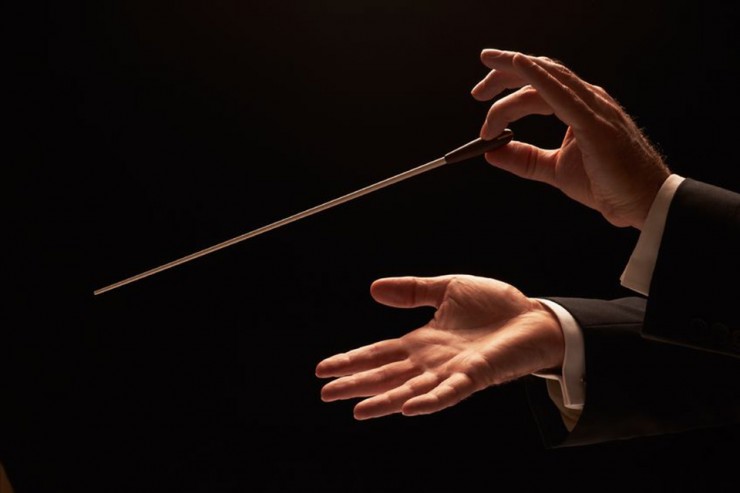There is another role that is common for the pianist. In this role, the soloist must now function as orchestra. No longer does the pianist make musical choices based solely upon their personal interpretation. Now, every decision is subject to the direction, vision, and mind of the conductor. The various settings where the pianist might sit under a conductor's baton are wide and varied; they range from large orchestras to choral ensembles, opera rehearsals, and churches. Regardless of the setting, the expectation of the pianist is always the same -- follow the conductor!
Personally, I did not do a lot of pianistic work under a conductor's baton during my studies. I've sang in choirs to fulfill the ensemble requirements for my degrees, but rarely served as the principle accompanist for the ensemble. As I grew into my profession, I found myself learning how to follow a conductor through rehearsals for musicals and a few high school choirs. My situation has changed immensely now that I am in West Texas. Currently, I sit under 6 different conductors on a semi-regular basis. These conductors include collegiate professors, Ministers of Music, and community musicians. A few of these conductors are among the best conductors I have ever sat under and I learn more about the art of working with a conductor each time I sit in one of their rehearsals. Most of the conductors I have had the pleasure to work with are actually quite good. I have been very lucky. Occasionally, there are people on the podium who should never have held a baton in their life. Thankfully, those encounters are few and far between!
I am not a conductor at all! Let's start with that statement from the beginning. My conducting consists of merely maintaining a beat pattern and attempting to convey some of the musical shape I want. I choose to remain behind the piano instead of on the podium for a reason. However, while sitting at the piano, I have learned that there are a few things that the pianist needs from the conductor in order to provide them with the best accompaniment possible.
- Clarity. Whether we are talking about the beat pattern or the verbal instructions coming from the podium, it is essential that your communication be clear. This is not a matter of enunciation either (although that also helps). When working through a difficult passage, please don't stop showing me where the downbeat of each measure is. If you are bouncing your hands in the air on every eighth note in an effort to "make music," you are probably not telling me much that I need to know. It is also helpful if you tell me -- and the other members of your ensemble -- where you are beginning in the score when addressing trouble spots. I am trying to read your mind as much as I can, but there are limits.
- Respect for my time. Most of the time, this is an extension of the clarity issue. Please thoroughly prepare your rehearsal before starting and know what you intend to do before your ensemble walks in the room. If I am waiting for you to figure out what you are doing next -- or worse, if you have to pause to figure out the rhythmic pattern that you are trying to teach -- you are not making the best use of my time. Additionally, please be aware of the ending time of the rehearsal. If things need to run longer than expected every once in a while, I'll be a team player and hang in there with you. If you are extending the length of the session every time I see you, I'm going to begin resenting the fact that you don't care about my other commitments and I will begin looking for an escape.
- Maintain a sense of humor and joyfulness. If you are not passionate about the music and enjoying the process, how can you expect those who sit under your baton to feel any differently? When things just aren't going right, a word from you -- whether it is witty, silly, or encouraging -- can change the direction of the entire rehearsal; often times, when you help us relax, things suddenly begin to improve dramatically as well.
- Give me honest feedback. I hope I'm doing a good job for you. It helps to hear your opinion on the subject too. Let me know what is working well and what's not. I can't fix things if I don't know there is a problem.
Let's face it.....sometimes we will all encounter a person standing on the podium who is calling themselves a "conductor" who probably shouldn't own a baton. If only there were a law against the misuse of such a powerful item! When this happens, what can a pianist do to make the best of the situation?
- Be a team player. Remember that you aren't the only one getting poorly communicated information. Do your best to support the ensemble.
- Ask questions. In some cases, the conductor just needs to be asked for clarity in order to make a change. A politely phrased question can often do wonders for everyone involved.
- Maintain a professional, positive attitude.
- Do the best you can in the situation. Thoroughly prepare your portion of the music and make sure that you are not adding to the confusion.
- Walk away from an unproductive situation if necessary. Sometimes we are experiencing more frustration than the help we are trying to provide. When these situations arise, make sure that you are finishing the commitment you are currently in (especially follow through to the performance that you are preparing for), give ample notice of your departure, and avoid unnecessary confrontation with the conductor at all costs.

